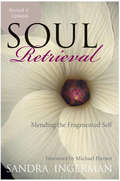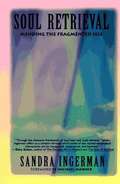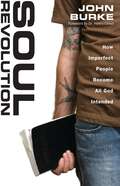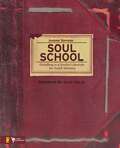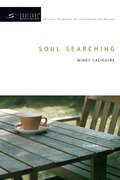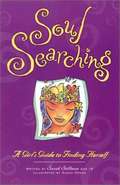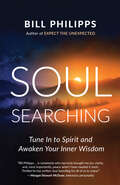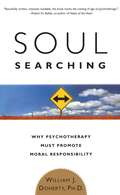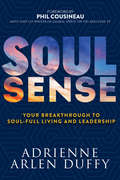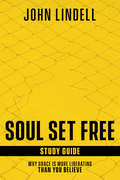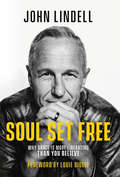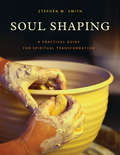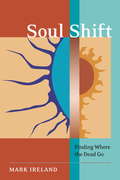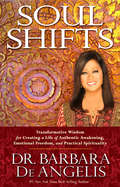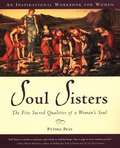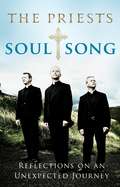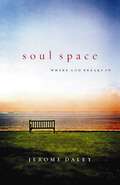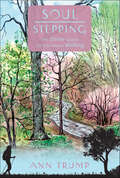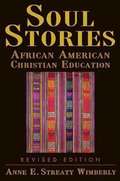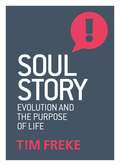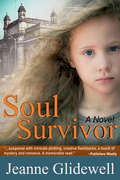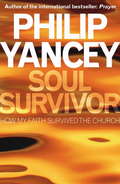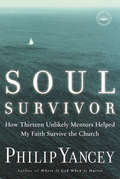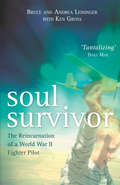- Table View
- List View
Soul Retrieval
by Sandra IngermanWith warmth and compassion, Sandra Ingerman describes the dramatic results of combining soul retrieval with contemporary psychological concepts in this visionary work that revives the ancient shamanic tradition of soul retrieval for healing emotional and physical illness. This revised and updated edition includes a new afterword by the author.
Soul Retrieval: Mending the Fragmented Self
by Michael Harner Sandra IngermanWith warmth and compassion, Sandra Ingerman describes the dramatic results of combining soul retrieval with contemporary psychological concepts in this visionary work that revives the ancient shamanic tradition of soul retrieval for healing emotional and physical illness. This revised and updated edition includes a new afterword by the author.
Soul Revolution: How Imperfect People Become All God Intended
by John BurkeYou’ve heard it all before. The promises for a better life get tiresome after awhile, because you know they don’t deliver. However, they do touch on a profound and inescapable truth. You were created to live your life out of a rewarding, richly textured relationship with God and others—and deep down, you long to experience that kind of life. But how? Are you willing to devote sixty days to finding out? Soul Revolution may be one of the most important books you’ll ever read. In it, author and pastor John Burke guides you on a journey of experiential discovery. Called the “60-60 Experiment,” it has already made a profound impact on thousands who have discovered what it means to actually “do life” with God.
Soul School: Enrolling in a Soulful Lifestyle for Youth Ministry
by Jeanne StevensWe all know that youth ministry can be hard. Sadly, many youth workers walk away from their jobs, their callings, and their passion because their interior worlds are falling apart. That's why Soul School is essential for developing an effective and health
Soul Searching: A Girl's Guide to Finding Herself
by Sarah StillmanWritten by a 16-year-old, this will guide you on the path to self-discovery, for your center, your inner voice and the meaning of life.
Soul Searching: Tune In to Spirit and Awaken Your Inner Wisdom
by Bill PhilippsRECONNECTING TO THE PUREST VERSION OF OURSELVES Reclaiming our destiny and moving forward requires finding our higher self — the innocent, virtuous, vulnerable child within us. Our spirit self is always in contact with that child, who wants us to be more imaginative, intuitive, honest, and open to receiving love, no matter what indoctrinations and toxic environments we have experienced. In Soul Searching, beloved psychic medium Bill Philipps shows how to reconnect to that spiritual nature we had as children and why those gifts we entered this life with are important. Using beautifully written stories and practical suggestions, Bill helps us access and build upon our innate skills of intuition, trust, forgiveness, and gratitude. He shows that it is not only possible but crucial to: • hear, feel, and honor our grief without being overwhelmed by it • forgive without forgetting • embrace and utilize the powers of gratitude, prayer, and setting intentions to manifest the life we desire • set ourselves and others fully free to live, love, and thrive
Soul Searching: Why Psychotherapy Must Promote Moral Responsibility
by William J. DohertyPaul, a divorced father, wants to back out of his child care arrangement and spend less time with his children. Nathan has been lying to his wife about a serious medical condition. Marsha, recently separated from her husband, cannot resist telling her children negative things about their father. What is the role of therapy in these situations? Trained to strive for neutrality and to focus strictly on the clients’ needs, most therapists generally consider moral issues such as fairness, truthfulness, and obligation beyond their domain. Now, an award-winning psychologist and family therapist criticizes psychotherapy’s overemphasis on individual self-interest and calls for a sense of moral responsibility in therapy.
Soul Sense: Your Breakthrough To Soul-Full Living and Leadership
by Adrienne Arien DuffyThrough the hundreds of people Adrienne Duffy has guided toward the realization of their full potential, and in the hundreds of workshops she has facilitated, one message has emerged universally over others: “We want something in addition to the achievement of goals and results. We are people who aim high and take risks, but we also long to have meaning and to be grounded. How can we create a more centered, purposeful life and workspace, in this era of constant change, chaos, and minute-by-minute progress?” Soul Sense is the answer: Listening to your Soul Call, stoking your Soul Fire, and practicing Soul Care brings depth, growth, and balance. Soul Sense can be thought of as common sense seasoned with the sixth sense. It is what is known as good, and right, and just in one’s personal and professional life, while embracing the powers of intuition that transcend such definitions. Soul Sense is logical and instinctual, practical and untamed. Tuning into and trusting your Soul Sense brings increasing fulfillment to your life, and to the lives of those around you. The courageous choice to honor your Soul Sense, ultimately, is up to you – and it is Duffy’s joy and intention to lead you toward this profound gift. Your Soul Sense awaits….
Soul Set Free Study Guide: Why Grace is More Liberating than You Believe
by John LindellRediscover the missing piece in what today&’s Christians believe about the Christian life. As lead pastor of one of America&’s biggest churches, John Lindell went on a personal quest for answers and discovered the true meaning behind God&’s grace, and when he came to see the full revelation of God&’s commitment to us, it changed his life forever. In this companion to Soul Set Free, the Soul Set Free Study Guide takes readers on a journey through the Book of Romans. Over the course of twelve sessions, readers will learn to no longer view the gospel as anything less than a truth that sets their soul free. The good news of the gospel is even better than what many Christians have come to believe. It brings joy but it&’s even better. It&’s forgiveness of sins but it&’s even better. It&’s God sending His only Son but it&’s even better. Soul Set Free June 4, 2019 ISBN: 978-1-62999-617-2 EISBN: 978-1-62999-618-9
Soul Set Free: Why Grace is More Liberating Than You Believe
by John LindellJust because you know and have experienced grace does not mean you fully understand it. This book will help you experience the freedom found in knowing just how fully God is committed to loving YOU.FOREWORD BY LOUIE GIGLIO Rediscover the missing piece in what today&’s Christians believe about the Christian life. As lead Pastor of one of America&’s biggest churches, John Lindell went on a personal quest for answers and discovered the true meaning behind God&’s grace, and when he came to see the full revelation of God&’s commitment to us, it changed his life forever. In Soul Set Free, Lindell invites you on a life-changing journey through the Book of Romans. Learn to no longer view the gospel as anything less than a truth that sets your soul free. The good news of the gospel can be summed up in three parts: Christ died for our sins, we are forgiven through faith in Christ, and heaven is our reward upon death. However, none of these parts cover what transpired when we were saved. The gospel is even better than what we believe. It brings joy but it&’s even better. It&’s forgiveness of sins but it&’s even better. It&’s God sending His only Son but it&’s even better.
Soul Shaping
by Stephen W. SmithSoul Shaping is a guide to the amazing journey of spiritual transformation. It is anchored in Scripture and filled with practical exercises designed for individual, small group or class use. These pages contain the challenge to look backward and forward, inward and outward, remember the past and dream for the future. Soul Shaping is an invitation to see yourself as you really are and imagine who you can become, an opportunity to explore the very hands of God that have and are shaping your one wild and precious life.
Soul Shift
by Mark Ireland Tricia J. RobertsonBusinessman Mark Ireland's father was Richard Ireland, a deeply spiritual minister and renowned psychic and medium who counted Mae West among his famous clients. While he loved his father, Mark followed a more conventional path in pursuit of mainstream success--until the wrenching death of his youngest son. This unexpected tragedy plunges Mark into the spiritual world of psychics and mediums in a frantic attempt to communicate with the dead. His defenses and pragmatic mindset begin to fade as he remembers premonitions on the day of his son's death. He consults a number of well-known mediums and is struck by the remarkably accurate information their readings provide. Mark first meets with Allison Dubois, the subject of NBC's hit show Medium, and later participates in a single-blind lab experiment with medium Laurie Campbell, filmed for a Discovery Channel feature. He then enters a new dimension of personal paranormal experience, as his own psychic awareness begins to unfold. This dramatic story of a father's unbearable loss and his discovery of life after death offers hope to the bereaved and compelling evidence that death may not be the end.From the Trade Paperback edition.
Soul Shifts: Transformative Wisdom For Creating A Life Of Authentic Awakening, Emotional Freedom & Practical Spirituality
by Barbara De AngelisThere are moments in our lives when we know that we’re poised on the threshold of greatness, of purpose, of true fulfillment and real happiness, but we don’t seem to be moving forward as rapidly as we want to—and staying where we are is no longer acceptable or comfortable. How we have been living, working, and loving just isn’t enough anymore. We are being called to something more significant, something more authentic, something more expanded and exalted. In these pivotal moments, what is needed is not simply change, but profound transformation—not simply an adjustment in our outer life, but a repositioning from the inside out. We are ready for Soul Shifts.Soul Shifts is a groundbreaking new book from New York Times best-selling author Barbara De Angelis Ph.D., one of the most influential teachers of our time in the field of personal and spiritual development, who for the past 35 years has reached tens of millions of people throughout the world with her inspirational messages about how to create a life of true freedom, mastery, and awakening. Now in Soul Shifts, her most powerful offering yet and the culmination of her life’s work, Dr. De Angelis offers a significant and radical re-visioning of the understanding of the journey of personal and spiritual transformation that will inspire and enlighten millions of longtime seekers as well as new arrivals to the path.What are Soul Shifts? They are powerful shifts in understanding, feeling, and consciousness that we make from within, shifts that will automatically transform our lives from the inside out. Rather than focusing on rearranging or managing ourselves and our lives on the outside, we learn how to operate from what Dr. De Angelis refers to as true Vibrational Mastery at the deepest level of who we are, the Soul Level. Places where we have felt stuck or stagnant and issues about which we’ve been unclear or confused all become illuminated with new, enlivened understanding. Pathways emerge where none seemed to exist, obstacles turn into possibilities, dead ends transform into doorways, and challenges convert into astonishing maps leading us to exciting new territories, all because we have made a Soul Shift.Dr. De Angelis says, "Our responsibility as Conscious Beings, sincere seekers, and planetary transformers is to rebirth ourselves over and over again." Soul Shifts is an invitation to accelerate your own personal and spiritual transformation in this time on our planet when stepping up into our highest self is desperately needed. Renowned for being a masterful teacher, Dr. De Angelis will offer you powerful and proven techniques for living a life of practical spirituality, everyday awakening, and making your own Soul Shifts.Written with great love, compassion, and respect, Soul Shifts welcomes the reader to a sacred inner journey, guiding him or her on nothing less than a pilgrimage to emotional and spiritual rebirth and attainment. It will leave all who experience it truly and authentically transformed.
Soul Sisters
by Pythia PeayA unique workbook to help women cultivate their full potential through the lives and lessons of the heroines of world spiritual traditions. Filled with exercises, anecdotes, quotes, and inspiration, Pythia Peay's Soul Sisters is designed to help women foster the traits that can be found in the great spiritual traditions of the world, and that are most needed in contemporary life. Each chapter shows how to cultivate the five "divine qualities": Courage, Faith, Beauty, Love, and Magic. Soul Sisters offers an abundance of examples of different female figures from the spiritual past and present who have embodied these characteristics in a distinctly feminine way. Through the road they have walked, readers can learn to discover their own individual heart-path to these strengths. Both an immensely practical workbook and an education in spiritual ideas, Soul Sisters is a companion for a lifetime.
Soul Song: Reflections On An Unexpected Journey by The Priests
by David Delargy Eugene O'Hagan Martin O'HaganKnown collectively as The Priests, Fr Martin, Fr Eugene and Fr David, have taken the music world by storm. Since they signed their much-reported Sony contract in front of Westminster Cathedral in April 2008, their album has sold almost 2,000,000 copies worldwide and broke the Guinness record for the fastest-selling debut classical album in the UK. It has also chalked up an impressive fifteen weeks at No. 1 on the Classic FM chart and was nominated for a Classical Brit Award. In June 2009, The Priests topped off their incredibly successful year with a highly-acclaimed mini-tour of the UK and Ireland. But long lunches in swanky restaurants and celebrity parties count for little with these down-to-earth, wonderfully talented singers, because first and foremost, David, Martin and Eugene are priests; their faith and the work they undertake in their busy parishes takes priority over everything else they do. So, whilst their gruelling promotional schedule for the album has taken them around the world - from Europe to Montreal and Toronto, from Washington to New York and Sydney, where they have played to packed houses and given dozens of press, radio and tv interviews - they have always been happy to return to their parishes in Belfast and the people they serve. Now in Soul Song, The Priests draw upon their unique experiences as priests and performers, their love of music and their faith, as they weave together a rich, illuminating tapestry of spiritual wisdom. Insightful and engaging, it is a treasury of memories which offers us all a rare and timely opportunity to reflect on our own journey through life.
Soul Space: Where God Breaks In
by Jerome DaleySo often there is a gap between the fulfilling life we long for and the frenzied life we live. We know the frustration all too well, but we long for something more. This book beckons readers to that place where God breaks in and restores meaning to the mundane.
Soul Stepping: Ten Divine Games to Play While Walking
by Ann TrumpImagine you could easily walk away from all your problems. What if you could go outside, take a hike around your neighborhood, and come back knowing exactly what to do? The simple act of walking can take you down the road to self-empowerment. Soul stepping is spiritual walking with purpose and intention and acts as a bridge between your physical body, your mind, and your spirit, leading to spiritual and emotional freedom. The secret is turning the walk into a game. Ten fun-and-easy games will deepen your relationship with your soul, help you connect with nature, improve your daily interactions with others, solve personal problems, sharpen your intuition, and invite synchronicity. Read stories enriching the games and practice suggestions for living a more soulful life. Rhymes and affirmations will allow you to recognize the wonders that occur at games’ end. You are about to embark on a walking soul journey!
Soul Stories: African American Christian Education
by Anne E. WimberlyIn this revision of Soul Stories, Dr. Wimberly moves even more in the direction of Christian Education with African American families. Soul stories link persons' everyday life with the Christian Scriptures. The soul stories in this revised volume take on a cross-generational orientation with emphasis on linking stories of family identities, events, relationships, and story plot with Bible stories and exemplary Christian faith stories found in the African Diaspora. This orientation builds on an awareness of the continued fragmentation of Black family life and the disconnect between generations on one hand, yet, on the other hand, the profound yearning of Black people for a common family history. The goal of Dr. Wimberly's model is to enliven the values associated with the image of "village" in order to empower and equip African Americans today.
Soul Story: Evolution and The Purpose of Life
by Tim FrekeThe grand religious stories that gave meaning to life and death in the past have crumbled under sceptical scrutiny. The dominant mainstream philosophy is now scientific objectivism, which describes a universe that exists for no reason and a life that ends in oblivion. Pioneering philosopher Tim Freke addresses the 'soul crisis' in modern culture that has arisen from lack of meaning. He offers an intelligent 'spiritual' perspective on life and death to help us make sense of a paradoxical world, which is sometimes bleak and banal, but also can be magical and full of significance. He presents a revolutionary paradigm shift in our understanding of reality that integrates the deepest insights of science and spirituality to create a new model of human identity, which makes the idea of the immortal soul intellectually credible. He explores the process of evolution, not as blind chance, but as the momentous story of the self-realising universe. The development of the material world has led to the emergence of 'psyche' or 'soul', which you are experiencing right now as a stream of thoughts and images that don?t exist in space and aren't made of matter. We are not insignificant specks in a vast purposeless cosmos. We are significant participants in the magnificent and meaningful story of soul. The universe is coming to know itself through each one of us and this process doesn't end at death, because the evolution of soul has also been the evolution of immortality.
Soul Surfer Devotions
by Bethany HamiltonShe's blonde, brave, and totally determined--she's a gutsy professional surfer who has inspired millions, and her biggest audience is teenage girls. In this devotional, Bethany speaks straight to her soul sisters about letting God lead in the epic ride of life.In this devotional, Bethany shares stories of women to admire, prayers to focus on, and wipeouts to avoid. Girls will hear thoughts on friends, family, faith, gossip, and peer pressure--Bethany covers it all.This book will release in time for the scheduled Spring 2011 launch of Bethany's movie, Soul Surfer, starring AnnaSophia Robb, Helen Hunt, Dennis Quaid, and Carrie Underwood. This re-release is updated with new content, a "Where Is She Now?" page, and journaling spots.
Soul Survivor
by Jeanne GlidewellHave you ever felt that you've lived a past life?On a sunny Kansas afternoon, six-year-old Skylar Robbins experiences her first flashback and claims to have once been Radha Joshi, a young woman who lived in India.As Skylar's nightmares and flashbacks worsen, her child-psychologist and past-life regressonist are convinced Skylar is recalling a genuine former lifetime with a tragic end.Hoping to find relief for their daughter and to patch up their marriage, Zoe and Trey leave everything behind for Bombay.In India, the situation intensifies as the truth about Radha’s disappearance and mysterious death unravels.REVIEWS:"...suspense with intricate plotting, creative flashbacks, a touch of mystery and romance. A memorable read." ~Publishers WeeklyOTHER TITLES by Jeanne Glidewell:THE LEXIE STARR MYSTERIES, in series orderLeave No Stone UnturnedThe Extinguished GuestHauntedWith This RingJust DuckyThe Spirit of the Season (A Holiday Novella)Cozy CampingMarriage and Mayhem
Soul Survivor
by Philip YanceyDisillusioned by the distortions and hypocrisies of the church in which he grew up, Philip Yancey set out in search of a life enhanced by faith instead of diminished by religion. Having struggled to forge personal convictions about God amid the ironies of life and the incongruities of religion, he looks closer at those whose lives radiate spiritual authenticity rather than pious posturing.From Dostoevsky to Martin Luther King, G. K. Chesterton to Paul Brand, Yancey pays homage to some of the most remarkable, selfless, Christ-like lives our world has known, and asks what both he and we can do to find such beautiful faith in our own lives.
Soul Survivor: How My Faith Survived the Church
by Philip YanceyPhilip Yancey, whose explorations of faith have made him a guide for millions of readers, feels no need to defend the church. "When someone tells me yet another horror story about the church, I respond, 'Oh, it's even worse than that. Let me tell you my story.'I have spent most of my life in recovery from the church."Yancey acknowledges that many spiritual seekers find few answers and little solace in the institutional church. "I have met many people, and heard from many more, who have gone through a similar process of mining truth from their religious past: Roman Catholics who flinch whenever they see a nun or priest, former Seventh Day Adventists who cannot drink a cup of coffee without a stab of guilt, Mennonites who worry whether wedding rings give evidence of worldliness."How did Yancey manage to survive spiritually despite early encounters with a racist, legalistic church that he now views as almost cultic? In this, his most soul-searching book yet, he probes that very question. He tells the story of his own struggle to reclaim belief, interwoven with inspiring portraits of notable people from all walks of life, whom he calls his spiritual directors. Soul Survivor is his tribute to thirteen remarkable individuals, mentors who transformed his life and work.Besides recalling their effect on him, Yancey also provides fresh glimpses of the lives and faith journeys of each one. From the scatterbrained journalist G. K. Chesterton to the tortured novelists Tolstoy and Dostoevsky, to contemporaries such as Martin Luther King, Jr., Annie Dillard, and Robert Coles, Yancey gives inspiring portraits of those who modeled for him a life-enhancing rather than a life-constricting faith."I became a writer, I now believe, to sort out and reclaim words used and misused by the Christians of my youth," Yancey says. "These are the people who ushered me into the Kingdom. In many ways they are why I remain a Christian today, and I want to introduce them to other spiritual seekers."Soul Survivor offers illuminating insights that will enrich the lives of veteran believers and cautious seekers alike. Yancey's own story, unveiled here as never before, is a beacon for those who seek to rejuvenate their faith, and for those who are still longing for something to have faith in.From the Hardcover edition.
Soul Survivor: The Reincarnation of a World War II Fighter Pilot
by Andrea Leininger Bruce LeiningerJames Leininger was just two years old when he began having disturbing nightmares that would not stop. He screamed out in the night: 'Plane on fire! Little man can't get out!' While nightmares are common among children, what happened next shocked those around him... James began to reveal details of planes and war tragedies that no two-year-old boy could know. His desperate parents were at a loss to help him until he said three things: 'Corsair', 'Natoma' and 'Jack Larsen'. From these tantalising clues, James's parents travelled thousands of miles and spent many long years piecing together these facts to try and find an answer that could end his torment. Finally, despite his mother's fears and his father's staunch Christian beliefs, they found only one possibility to the endless coincidences that surrounded every detail in James's life – that their son was reliving the past life of a World War II fighter pilot.Their touching story is one that will challenge sceptics and confirm the beliefs of those who already believe in life after death.
